German film actress and author Barbara Rütting (1927) appeared in 45 films between 1952 and 1983. Later she became a well known human rights and animal welfare activist.
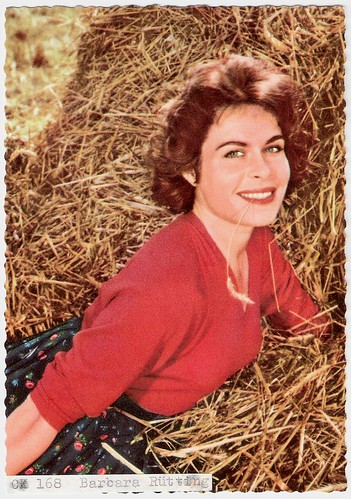
German postcard by UFA (Universum-Film Aktiengesellschaft), Berlin-Tempelhof, no. CK-168. Retail price: 30 Pfg. Photo: Klaus Collignon / UFA.
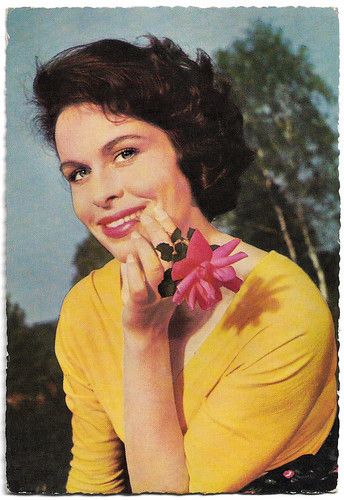
German postcard by WS-Druck, Wanne-Eickel, no F 16. Photo: Klaus Collignon.
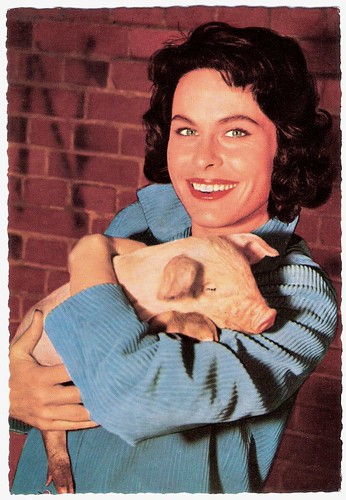
German postcard by WS-Druck, Wanne-Eickel, no. F 115. Photo: Ringpress / Vogelmann / Bavaria.
Barbara Rütting was born as Waltraut Irmgard Goltz in Ludwigsfelde-Wietstock, Germany in 1927. She was one of the five children of Johanna and Richard Goltz, who were both teachers.
After her graduation in 1945, she fled to Denmark, where she worked first as a servant and later in a library and as a foreign correspondent. In 1946 she married Hans Rütting.
In 1952 she made her stage debut in the city of Krefeld in Die Tochter des Brunnenmachers (The Daughter of the Well Maker). Many stage roles in theatres all over Germany followed.
That year she also made her first film appearance as the female lead in the comedy Postlagernd Turteltaube/Poste restante turtledove (Gerhard T. Buchholz, 1952). Next she played a Russian soldier in Die Spur führt nach Berlin/International Counterfeiters (Frantisek Cáp, 1952). For this role she was awarded with the Bundesfilmpreis for Best Newcomer.
In the following decade, she played leading roles in such films as the war drama Die letzte Brücke/The Last Bridge (Helmut Käutner, 1954) with Maria Schell, the biographical drama Canaris (Alfred Weidenmann, 1954) opposite O.E. Hasse as the chief of the intelligence service of Nazi Germany, the Heimatfilm Die Geierwally (Frantisek Cáp, 1954) with Carl Möhner, and the crime film Herz ohne Gnade/Heart Without Pity (Viktor Tourjansky, 1958) with Hansjörg Felmy.
Rütting also appeared in foreign films, such as A Time to Love and a Time to Die (Douglas Sirk, 1958) based on the novel by Erich Maria Remarque and starring John Gavin.
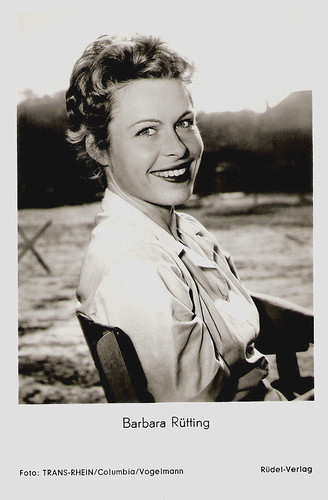
German postcard by Rüdel-Verlag, Hamburg-Bergedorf, no. 1215. Photo: TRANS-RHEIN / Columbia / Vogelmann. Publicity still for Das Zweite Leben/A Double Life (Victor Vicas, 1954).
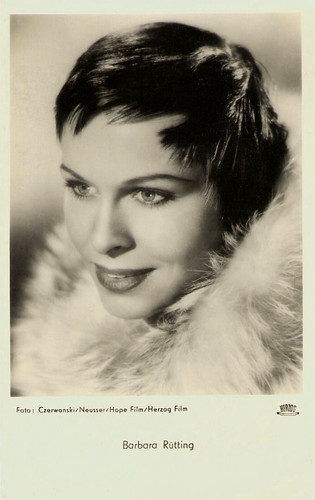
French postcard by Editions P.I., Paris, no. 18H. Photo: Czerwonski / Neusser / Hope Film / Herzog Film. Publicity still for Spionage/Espionage (Franz Antel, 1955).
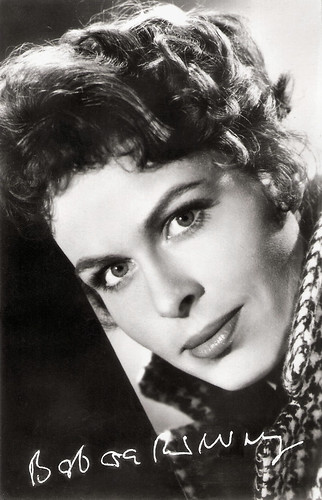
East-German postcard by VEB Progress Film-Vertrieb, no. P 24/480, 1957. Photo: Michaelis / Real-Film. Publicity still for Glücksritter/A Modern Story (Arthur Maria Rabenalt, 1957).
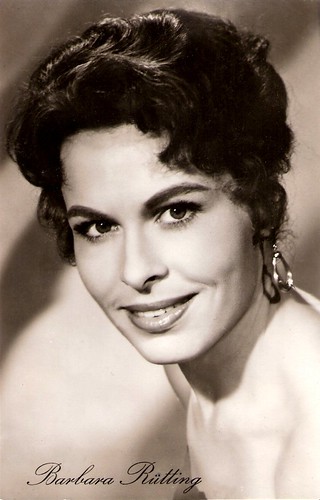
East-German postcard by VEB Progress Filmvertrieb, Berlin, no. P 76/479, 1958. Retail price: 0,20 DM. Photo: Real Film / Michaelis. Publicity still for Glücksritter/A Modern Story (Arthur Maria Rabenalt, 1957).
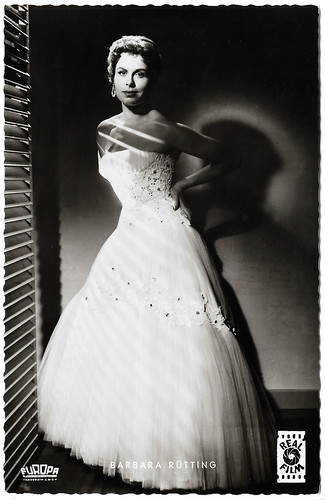
German postcard by Kunst und Bild, Berlin, no. S 726. Photo: Michaelis / Real-Film / Europa. Publicity still for Glücksritter/A Modern Story (Arthur Maria Rabenalt, 1957).
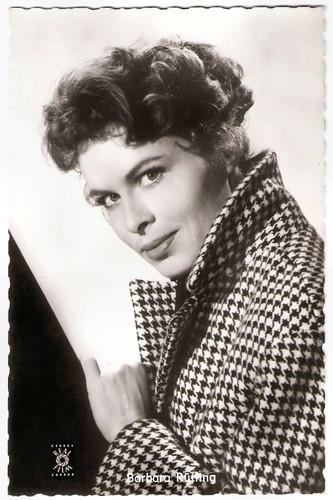
German postcard by Kolibri-Verlag, Minden/Westf. Photo: Real Film. Publicity still for Glücksritter/A Modern Story (Arthur Maria Rabenalt, 1957).
Barbara Rütting played the female lead opposite Kirk Douglas in Town Without Pity (Gottfried Reinhardt, 1961), a hard hitting, depressing and brutal courtroom drama about the rape of a 16-year old girl (Christine Kaufmann).
At IMDb, Michael Elliott writes that there was a lot of controversy around the film at the time: “United Artists put a warning on the film and asked theater owners not to let anyone under 17 into the film. Several theater owners wouldn't even show the film due to its subject matter. I think all of this controversy hurt the film when it was released but I think it's about time film buffs and film historians go back and take a look at this film and include it with the greatest courtroom films out there. This film still manages to shock and be outrageous nearly forty-five years after being released.”
Rütting appeared with Martin Held in the romantic comedy Liebe will gelernt sein/Love wants to be learned (Kurt Hoffmann, 1963), based on a play by Erich Kästner.
She played in such Edgar Wallace krimis as Der Zinker/The Squeaker (Alfred Vohrer, 1963) with Heinz Drache, and Das Phantom von Soho/Murder by Proxy (Franz Josef Gottlieb, 1964) with Dieter Borsche.
Rütting also had a supporting part in the war drama Operation Crossbow (Michael Anderson, 1965) starring Sophia Loren.
When the German cinema got in a deep crisis, Rütting appeared more and more on TV. She guest starred in such popular krimi series as Der Kommissar/The Commissioner (1975), Der Alte/The Old Fox (1980) and Derrick (1981).
In the meanwhile she also was active as an author and since her debut novel Die maßlose Zärtlichkeit (1970, The immoderate tenderness), she wrote several successful children's and (vegetarian) cook books.
In 1983 she retired from acting and since then she became a well known human rights and animal welfare activist. She organised help projects and taught cooking in hospitals for victims of the Chernobyl disaster.
In 2003, she was elected into the Landtag (state parliament) of Bavaria for the Green Party. In 2008 she left both the Landtag and the Green party.
Barbara Rütting was married to Hans Rütting (1946-1951) and to count Heinrich von Einsiedel (1955-1964). Both marriages ended in a divorce. Between 1969 and 1988 her partner was Lutz Hochstraate.
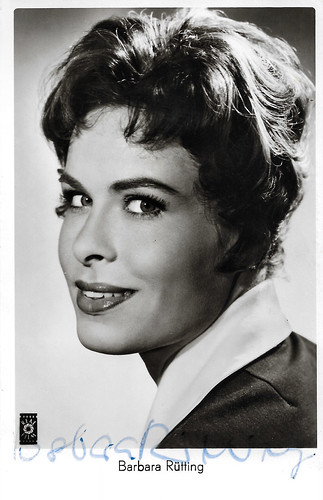
German postcard by Franz Josef Rüdel, Filmpostkartenverlag, Hamburg-Bergedorf. Photo: Real-Film / NF / Gabriele.
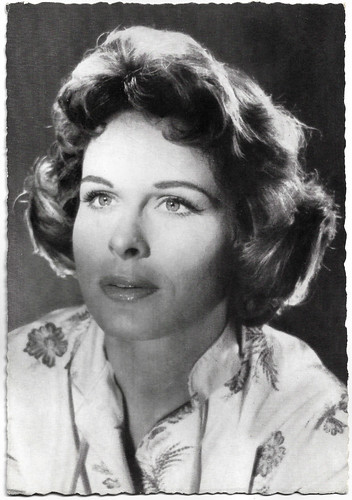
German postcard by WS-Druck, Wanne-Eickel, no. 308. Photo: Rapid / Union / Reiter.
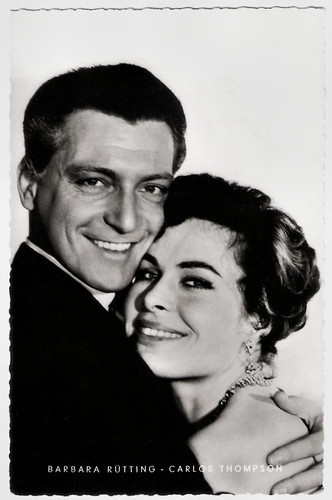
German postcard by Kunst und Bild, Berlin-Charlottenburg, no. A 1544. Photo: Deutsche Cosmopol Film / Haenchen. Publicity still for Ich war ihm hörig/I Was All His (Wolfgang Becker, 1958) with Carlos Thompson.
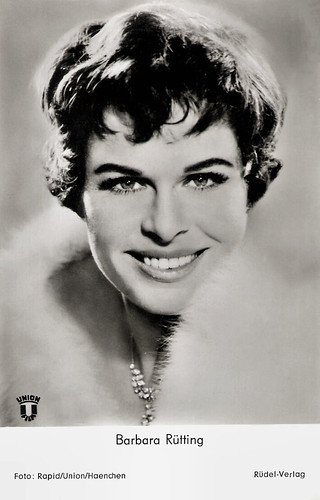
German postcard by Rüdel-Verlag, Hamburg-Bergedorf, no. 2632. Photo: Rapid / Union / Haenchen.

East-German postcard by VEB Progress Film-Vertrieb, Berlin, no. 172/70, 1970. Photo: Progress. Publicity still for Neues vom Hexer/Again the Ringer (Alfred Vohrer, 1965).
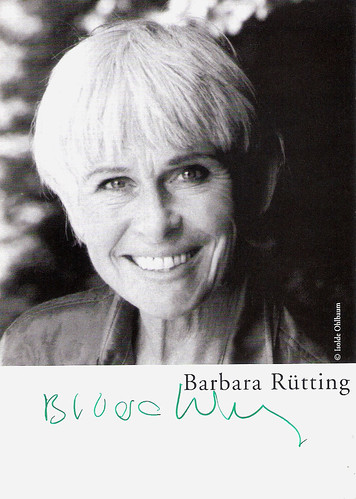
German autograph card by Goldmann Verlag. Photo: Isolde Ohlbaum.
British trailer for Der Zinker/The Squeaker (1963). Source: Rialto Film (YouTube).
Trailer Neues vom Hexer (1965). Source: Rialto Film (YouTube).
Sources: BarbaraRuetting.de (German), Wikipedia (German and English), and IMDb.

German postcard by UFA (Universum-Film Aktiengesellschaft), Berlin-Tempelhof, no. CK-168. Retail price: 30 Pfg. Photo: Klaus Collignon / UFA.

German postcard by WS-Druck, Wanne-Eickel, no F 16. Photo: Klaus Collignon.

German postcard by WS-Druck, Wanne-Eickel, no. F 115. Photo: Ringpress / Vogelmann / Bavaria.
Best Newcomer
Barbara Rütting was born as Waltraut Irmgard Goltz in Ludwigsfelde-Wietstock, Germany in 1927. She was one of the five children of Johanna and Richard Goltz, who were both teachers.
After her graduation in 1945, she fled to Denmark, where she worked first as a servant and later in a library and as a foreign correspondent. In 1946 she married Hans Rütting.
In 1952 she made her stage debut in the city of Krefeld in Die Tochter des Brunnenmachers (The Daughter of the Well Maker). Many stage roles in theatres all over Germany followed.
That year she also made her first film appearance as the female lead in the comedy Postlagernd Turteltaube/Poste restante turtledove (Gerhard T. Buchholz, 1952). Next she played a Russian soldier in Die Spur führt nach Berlin/International Counterfeiters (Frantisek Cáp, 1952). For this role she was awarded with the Bundesfilmpreis for Best Newcomer.
In the following decade, she played leading roles in such films as the war drama Die letzte Brücke/The Last Bridge (Helmut Käutner, 1954) with Maria Schell, the biographical drama Canaris (Alfred Weidenmann, 1954) opposite O.E. Hasse as the chief of the intelligence service of Nazi Germany, the Heimatfilm Die Geierwally (Frantisek Cáp, 1954) with Carl Möhner, and the crime film Herz ohne Gnade/Heart Without Pity (Viktor Tourjansky, 1958) with Hansjörg Felmy.
Rütting also appeared in foreign films, such as A Time to Love and a Time to Die (Douglas Sirk, 1958) based on the novel by Erich Maria Remarque and starring John Gavin.

German postcard by Rüdel-Verlag, Hamburg-Bergedorf, no. 1215. Photo: TRANS-RHEIN / Columbia / Vogelmann. Publicity still for Das Zweite Leben/A Double Life (Victor Vicas, 1954).

French postcard by Editions P.I., Paris, no. 18H. Photo: Czerwonski / Neusser / Hope Film / Herzog Film. Publicity still for Spionage/Espionage (Franz Antel, 1955).

East-German postcard by VEB Progress Film-Vertrieb, no. P 24/480, 1957. Photo: Michaelis / Real-Film. Publicity still for Glücksritter/A Modern Story (Arthur Maria Rabenalt, 1957).

East-German postcard by VEB Progress Filmvertrieb, Berlin, no. P 76/479, 1958. Retail price: 0,20 DM. Photo: Real Film / Michaelis. Publicity still for Glücksritter/A Modern Story (Arthur Maria Rabenalt, 1957).

German postcard by Kunst und Bild, Berlin, no. S 726. Photo: Michaelis / Real-Film / Europa. Publicity still for Glücksritter/A Modern Story (Arthur Maria Rabenalt, 1957).

German postcard by Kolibri-Verlag, Minden/Westf. Photo: Real Film. Publicity still for Glücksritter/A Modern Story (Arthur Maria Rabenalt, 1957).
Edgar Wallace Krimis
Barbara Rütting played the female lead opposite Kirk Douglas in Town Without Pity (Gottfried Reinhardt, 1961), a hard hitting, depressing and brutal courtroom drama about the rape of a 16-year old girl (Christine Kaufmann).
At IMDb, Michael Elliott writes that there was a lot of controversy around the film at the time: “United Artists put a warning on the film and asked theater owners not to let anyone under 17 into the film. Several theater owners wouldn't even show the film due to its subject matter. I think all of this controversy hurt the film when it was released but I think it's about time film buffs and film historians go back and take a look at this film and include it with the greatest courtroom films out there. This film still manages to shock and be outrageous nearly forty-five years after being released.”
Rütting appeared with Martin Held in the romantic comedy Liebe will gelernt sein/Love wants to be learned (Kurt Hoffmann, 1963), based on a play by Erich Kästner.
She played in such Edgar Wallace krimis as Der Zinker/The Squeaker (Alfred Vohrer, 1963) with Heinz Drache, and Das Phantom von Soho/Murder by Proxy (Franz Josef Gottlieb, 1964) with Dieter Borsche.
Rütting also had a supporting part in the war drama Operation Crossbow (Michael Anderson, 1965) starring Sophia Loren.
When the German cinema got in a deep crisis, Rütting appeared more and more on TV. She guest starred in such popular krimi series as Der Kommissar/The Commissioner (1975), Der Alte/The Old Fox (1980) and Derrick (1981).
In the meanwhile she also was active as an author and since her debut novel Die maßlose Zärtlichkeit (1970, The immoderate tenderness), she wrote several successful children's and (vegetarian) cook books.
In 1983 she retired from acting and since then she became a well known human rights and animal welfare activist. She organised help projects and taught cooking in hospitals for victims of the Chernobyl disaster.
In 2003, she was elected into the Landtag (state parliament) of Bavaria for the Green Party. In 2008 she left both the Landtag and the Green party.
Barbara Rütting was married to Hans Rütting (1946-1951) and to count Heinrich von Einsiedel (1955-1964). Both marriages ended in a divorce. Between 1969 and 1988 her partner was Lutz Hochstraate.

German postcard by Franz Josef Rüdel, Filmpostkartenverlag, Hamburg-Bergedorf. Photo: Real-Film / NF / Gabriele.

German postcard by WS-Druck, Wanne-Eickel, no. 308. Photo: Rapid / Union / Reiter.

German postcard by Kunst und Bild, Berlin-Charlottenburg, no. A 1544. Photo: Deutsche Cosmopol Film / Haenchen. Publicity still for Ich war ihm hörig/I Was All His (Wolfgang Becker, 1958) with Carlos Thompson.

German postcard by Rüdel-Verlag, Hamburg-Bergedorf, no. 2632. Photo: Rapid / Union / Haenchen.

East-German postcard by VEB Progress Film-Vertrieb, Berlin, no. 172/70, 1970. Photo: Progress. Publicity still for Neues vom Hexer/Again the Ringer (Alfred Vohrer, 1965).

German autograph card by Goldmann Verlag. Photo: Isolde Ohlbaum.
British trailer for Der Zinker/The Squeaker (1963). Source: Rialto Film (YouTube).
Trailer Neues vom Hexer (1965). Source: Rialto Film (YouTube).
Sources: BarbaraRuetting.de (German), Wikipedia (German and English), and IMDb.
2 comments:
Wonderful post Bob. She seems like a lovely person, inside and out
Thanks Bunchie. I do agree.
Post a Comment